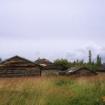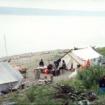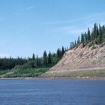Why are Gwich'in heritage resources important?
- they describe how Gwich'in used the land and where Gwich'in people lived from the earliest days on;
- they are valued for cultural, spiritual and religious reasons because they reflect Gwich'in identity and way of life; and
- they help educate Gwich'in people and others about the traditional way of life.
What are Gwich'in heritage resources?
Heritage deals with a people's history. Gwich'in heritage resources include all things that relate to the history and culture of the Gwich'in including:
Places:
-
archaeological sites and traditionally significant places which according to Gwich'in oral history are important for cultural or spiritual reasons;
-
historic places important to the Gwich'in since the arrival of Europeans. These include fish camps like Tree River, trading posts such as LaPierre House, the old mission at Teetshik Goghaa (old Arctic Red), or gold rush sites such as Destruction City and Wind City; and
- burial sites. These can be found anywhere Gwich'in ancestors travelled extensively.
Artifacts and Objects:
-
things can also have historical, cultural or religious value. Examples include moose and caribou skin clothing that people used to wear or stone axes and other tools from the early days.
Records:
-
These are elders' stories that have been recorded by the Gwich'in Social and Cultural Institute and others, as well as documents, maps, drawings and photographs that can be found in archives in Canada and elsewhere. Examples include the archives in Yellowknife that have documents from the RCMP post in Tsiigehtchic and the Anglican Church Archives in Toronto that contain journals from St. Matthew's Mission in Fort McPherson.
Who manages heritage resources in the Gwich'in Settlement Area?
The Gwich'in Social and Cultural Institute oversees the heritage chapter of the Land Claim. It works closely with the Gwich'in communities, and the Territorial and Federal governments to carry out these responsibilities.
The Gwich'in Tribal Council will be consulted when the government makes laws, policies, or sets up boards to deal the Gwich'in heritage resources in the Mackenzie Valley. The Gwich'in will be represented on these boards.
Will Gwich'in heritage sites be protected?
The Gwich'in can provide the government with a list of historic, archaeological and burial sites that need to be protected. These sites will be protected through existing laws.
Can people use the land where Gwich'in heritage resources are located?
The Gwich'in Land and Water Board issues land use permits. Before they give a permit:
-
information is gathered about any heritage resources that exist in the area;
-
how they might be harmed; and
-
how they should be taken care of.
The Land and Water board will consider advice from the Social and Cultural Institute and the Gwich'in Tribal Council before issuing the permit.
Can people get permission to work on Gwich'in archaeological sites?
The government can give permits for work on archaeological sites or on historic resources. For example, archaeologists who want to dig at one of the old sites would need a permit. Everyone who receives permit must:
-
consult with the Gwich'in community;
-
deliver a technical and non-technical report on the work; and
-
restore and protect the site if necessary.
Are there jobs related to heritage resources for the Gwich'in?
Gwich'in will be hired first for work at sites or projects that are located in the Settlement Area. These sites or projects can include museums, archaeological sites and other heritage resource projects. The rules for hiring Gwich'in to work on these projects are described in the protected area agreement or in the project work plan.
How can Gwich'in heritage resources be brought back to the Settlement Area?
When appropriate, the Gwich'in and the government will work together to return Gwich'in heritage resources that have been removed from the Settlement Area. This can be done if the Settlement Area has a proper place to take good care of and display the resource.
Can traditional place names be used in the Gwich'in Settlement Area?
Gwich'in place names are important because they reflect traditional culture, history, and values. The Gwich'in can ask the government to have the names of lakes, rivers, mountains and other places in the Settlement Area changed back to the traditional names. The Gwich'in Tribal Council will be consulted on any place name change in the Settlement Area.



